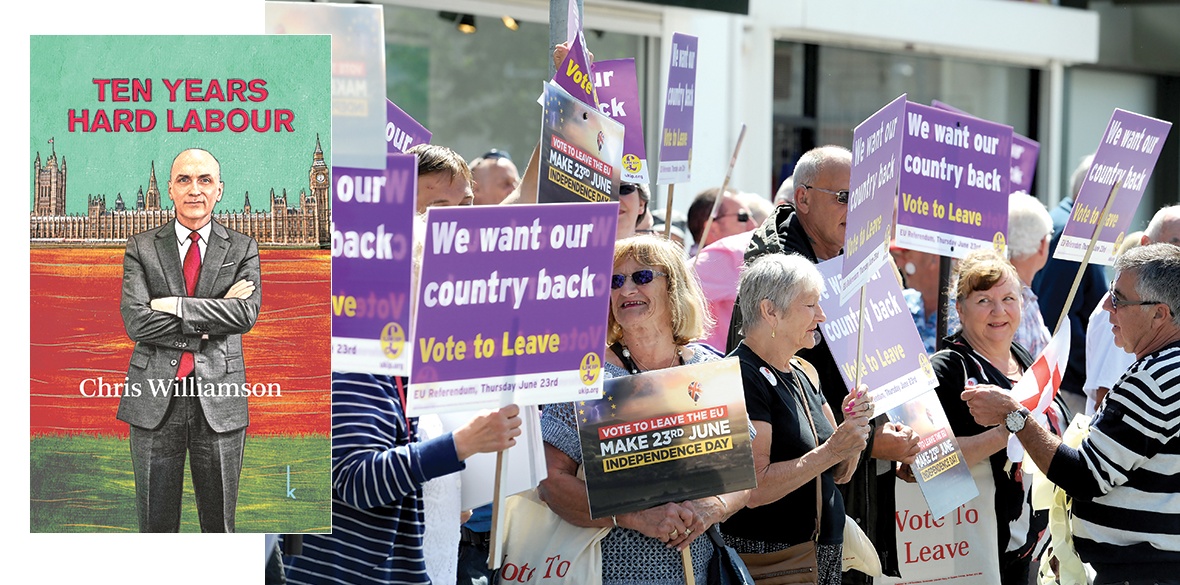This is the last article you can read this month
You can read more article this month
You can read more articles this month
Sorry your limit is up for this month
Reset on:
Please help support the Morning Star by subscribing here
TEN YEARS HARD LABOUR will make you angry — whether you agree with it or not.
Chris Williamson’s deeply personal account of the decade between his first election as a Labour MP in 2010 and the end of the Jeremy Corbyn leadership in 2020 is a painful read.
Most of us were involved, after all, in trying to turn the huge positive potential of Labour’s socialist advance from 2015 into reality and struggled against the slow motion car crash of 2017-19.
This is that story. Williamson rattles through his experiences of the 2010-15 parliament, arguing convincingly that Ed Miliband’s failure to develop an alternative to the punishing “austerity” being inflicted on the country by the Conservative-Lib Dem coalition undermined its chances in 2015.
Ominous here are future echoes of the problems Corbyn was to face writ large.
Not just the way Miliband’s better instincts were suppressed by an overwhelmingly right-wing parliamentary party, but the “blinkered policy wonks ... too clever for their own good” who won Miliband to a strategy based on winning a narrow parliamentary majority with 35 per cent of the vote, rather than a genuine push to maximise Labour support across the country.
There are clear parallels in Labour’s disastrous Brexit positioning after 2018, while the snobbish disdain Williamson records from right-wing MPs about “working-class voters” in that period has more in common than some Corbyn supporters would care to admit with the later — electorally suicidal — dismissal of Brexit supporters as racist “gammons.”
The main body of the book takes up the story from 2017, when Williamson was re-elected MP for Derby North.
The memory of these years is fresh and Williamson’s account will be controversial.
He believes that the Corbyn movement was undermined by its timidity: by a “government-in-waiting” mentality that stripped it of the very radicalism that had enthused so many from 2015-17; by a futile appeasement strategy that saw it make endless “concessions” to irreconcilable opponents; and above all by a failure to show solidarity with victims of a sweeping right-wing witch hunt.
Williamson’s own disciplinary process was an unmitigated farce, as the Morning Star pointed out at the time — culminating in a blatantly political re-suspension in response to a right-wing outcry when his suspension was lifted. (Labour was later found in the High Court to have acted unfairly).
There was no semblance of justice in the show trials of other prominent left-wingers such as Marc Wadsworth, and of course for each of these famous names larger numbers of ordinary Labour members were being subjected to the same treatment.
The most controversial contention of Williamson’s here is that Labour’s disciplinary process got worse, not better, when Jennie Formby replaced Iain McNicol as general secretary.
Many on the left rightly point to the faster processing of anti-semitism charges under Formby as evidence that the Corbyn leadership was not obstructing the disciplinary process, which was far slower under McNicol, a Corbyn opponent. But Williamson’s case, that faster processing isn’t necessarily a good thing if the process is unfair, is a serious one.
The accounts of individual “betrayals” make difficult reading and many named individuals will have alternative accounts of what they did and why. But the left does need to face up to the consequences of failing to stand together in the face of the right-wing onslaught.
“Chris Williamson is not the hill to die on,” one Corbyn adviser is quoted as remarking. So what was?
Corbyn himself was clearly the real target, and sacrificing pieces to protect the king simply left the leader exposed and unable to respond properly to dubious accusations since they had been accepted when levelled at others.
Many prominent voices on the left joined in a campaign of public vilification obviously directed by Corbyn’s enemies. Williamson pulls no punches here.
The motivations of the accusers should also have been assessed more shrewdly: Williamson was, again as the Morning Star noted at the time, more likely singled out because of attempts to democratise MPs’ selection processes than because other MPs really thought he was anti-semitic.
The book has flaws. For me, the most prominent was not content but tone: the important points it makes can be undermined by language that drips with contempt for adversaries, which could turn off anyone not already on side. By page 3 he has referred to another MP as a “pompous prat,” and the wording doesn’t soften.
Politically, I would argue the Brexit miscalculations were of greater eventual significance than the anti-semitism allegations in bringing Corbynism down, and while Williamson recognises calls for a second referendum were an error his emphasis is strongly on the latter.
But then this is a personal memoir, and anti-semitism allegations were deployed against Williamson himself. A section toward the end on terminology around anti-semitism raises issues too complex to discuss in detail here, but would meet strong disagreement from many socialist and non-zionist Jews as well as from zionists.
There are other points of disagreement. But despite them, Ten Years Hard Labour is an important book.
We are currently seeing an upsurge in trade union militancy.
If as Nye Bevan — quoted by Williamson — said, Parliament acts as a “social shock absorber placed between privilege and the pressure of popular discontent,” then the current lack of a serious parliamentary opposition may actually sharpen the coming clashes.
There is an opportunity for the left to win workers taking action to a vision of more fundamental change. We cannot afford to repeat the mistakes of the Corbyn period.
That means facing up to them, and Williamson’s scathing account contains more truth than many will wish to acknowledge.
Ten Years Hard Labour is published by Lola Books, £19.

 Ben Chacko
Ben Chacko








